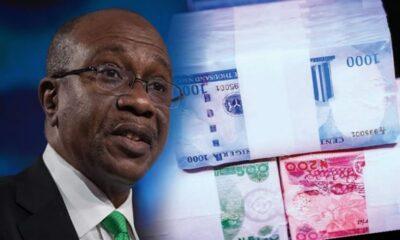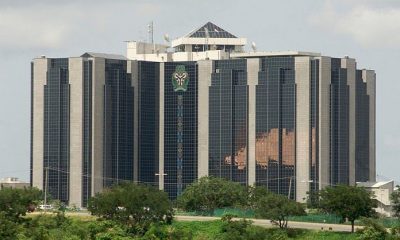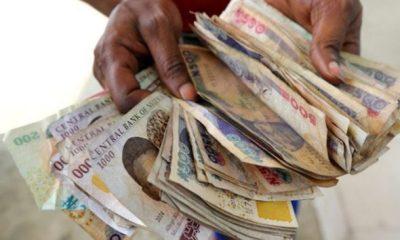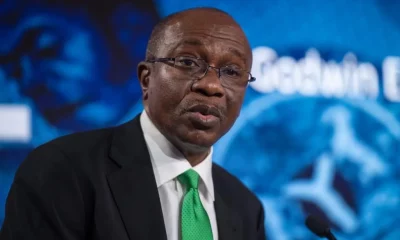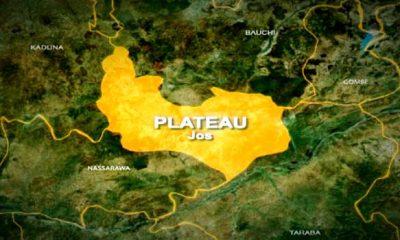Business
New Naira Notes: Panic, Confusion As Nigerians Count Down To Deadline
Published
1 year agoon
By
Editor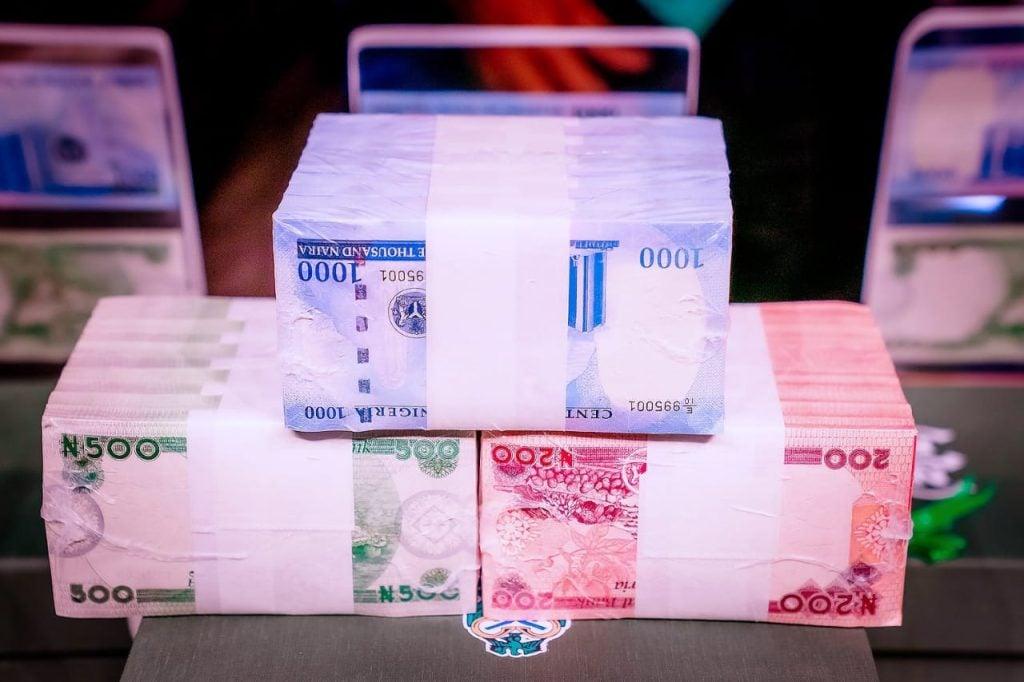
Across the country, Nigerians are living in uncertain times regarding their money, both the cash at hand and the one they have saved in the banks as the Central Bank Governor, Godwin Emefiele insists that the January 31st deadline for the usage of old currency notes remains sacrosanct.
“As things stand, the N200 denomination is scarce. We rely a lot on N200 notes, but we don’t have it. I still have lots of N200 in my box,” Dolapo Michael, a trader in Yaba area in Lagos State, told DAILY POST.
Mrs Michael’s predicament is not in isolation as many Nigerians are faced with uncertainty over the latest policy by the CBN. While the apex bank insisted that the policy is targeted at mopping up cash into the banking sector, however, it has become a political issue.
Bola Tinubu, the presidential candidate of the All Progressives Congress (APC) at the party’s campaign rally in Abeokuta, the Ogun State capital, alleged that the policy was targeted at him.
The two chambers of the National Assembly also asked the CBN to as a matter of urgency extend the period by 6 months; however, the CBN boss insisted that there shall be no extension.
READ ALSO: Naira Notes: Why Talks With CBN, Banks’ CEOs Failed To Hold — Reps
Even the threat of a warrant of arrest has not swayed the CBN boss as he shunned the invitation of the House on two occasions.
The lawmakers are insisting that section 20 of the CBN Act mandates commercial banks to continue to accept the old notes even after the expiration of the deadline.
“The House is also aware that Section 20 (3) Central Bank of Nigeria (CBN) Act mandates the CBN to redeem the face value of the recalled currency upon demand, even after the expiration of the notice of recall. Notwithstanding the deadline imposed by the Central Bank of Nigeria(CBN), this House will see to it that this provision of the law is honoured in full,” Femi Gbajabiamila, the Speaker of the House said on Thursday.
However, banks have insisted that they will comply with the directive of the CBN on the subject matter.
On Friday, First Bank announced that it will no longer accept the old notes by 1st of February, therefore, urging its customers to take advantage of the weekend to deposit their old currency.
“This is to notify the general public that all our branches will be open on Saturday and Sunday just to receive cash.
“All old Naira notes of series 200, 500, and 1000 will cease to be in use from the 31st of January,” he said.
On Thursday, during a meeting between the banks and the committee of the House, bankers acknowledged that the new notes are not sufficient to meet the demand of Nigerians.
READ ALSO: CBN Gives Update On Deadline On Old Naira Notes Deposit
The representative of Sterling Bank, Orlando Umoren informed the lawmakers that the CBN rationed the money to different banks, but it was not sufficient to meet their needs.
He stated that Sterling Bank gets N150 million weekly for its branches in Kaduna, while N100m is shared among all its branches in Kano metropolis.
Also, the representative of Access Bank, Hadiza Ambuza said the bank is only able to disburse 10% of the total money it collects from customers.
“We are paying as much as we get. We are collecting the money and loading it at the ATM as quickly as we get it. Unfortunately, we are not getting them quickly. We have gotten about 10 percent of the total money. That is a challenge that we have. We are doing the best we can up until the deadline,” she said.
Despite the low circulation, the banks are following the directive of the CBN on the deadline.
The House of Representatives has insisted it will suspend its planned recess to address the issue and is willing to issue a warrant of arrest on Emefiele and speak with President Muhammadu Buhari.
Hakeem Liadi, a resident of Isanlu, in Kogi State, told DAILY POST that due to activities of armed robbers along the Kabba-Ilorin road, most banks have shut down and they rely on POS.
“In some instances, POS operators now charge as much as N100 on every N1,000 for Nigerians to get new notes,” Leadi said, adding that “We use POS for our transactions, it is like our own bank. With the rush, POS are also struggling to get the new notes. So, when they charge extra, we cannot complain.”
Lekan Olaleye, an economist, who spoke to DAILY POST, said the policy may be conceived with good intentions, however, the implementation may cause a significant impact on the economy.
“The CBN must understand that Nigeria is far from a cashless economy. Perhaps, they are overestimating data from POS terminals. As it stands, POS in Nigeria are for withdrawal of money not payment for goods. This economy still relies heavily on cash.
READ ALSO: Reps Ask CBN To Extend Deadline For Old Notes, Summon Bank MDs
“By Monday, most commercial drivers may not want to accept the old note in fear of the deadline, but from findings, the new money is not circulating well enough. The CBN should have used the POS agents to speed up the circulation,” he noted.
When Mr Olaleye was asked about the intent of the CBN to curb kidnapping and vote buying by politicians, he said the mischief the bank seeks to curb may create a bigger problem.
“Poison is not the cure for cancer. Can the banks cope with the demand for money on February 1st? Apart from that, a large percentage of daily transactions still involves cash,” he said.
DAILY POST
You may like


Tinubu Lists Six Ways To End New Naira Woes


Naira Redesign: CBN Deadline Insensitive, Spells Doom For Country’s Economy – Experts


CBN Gives Update On Deadline On Old Naira Notes Deposit


Locals Reject Old Naira, As Scarcity Of New Notes Hits Kaduna


New Naira Notes: CBN Talks Tough, Threatens Banks N1m Fine


Stories Of New Bank Notes Untrue, CBN Tells Traders

The Central Bank of Nigeria (CBN) started fresh and direct sales of US dollars at N1,021 per dollar to Bureau De Change operators.
Nigeria’s apex bank disclosed this in a circular signed by its Director of Trade and Exchange Department Hassan Mahmud.
“We write to inform you of the sale of $10,000 by the Central Bank of Nigeria (CBN) to BDCs at the rate of N1,021/$1. The BDCs are in turn to sell to eligible end users at a spread of NOT MORE THAN 1.5 percent above the purchase price,” the circular posted on its website read.
READ ALSO: Tinubu Unveils African Counter-Terrorism Summit
“ALL eligible BDCs are therefore directed to commence payment of the Naira deposit to the underlisted CBN Naira Deposit Account Numbers from today, Monday, April 22, 2024, and submit confirmation of payment, with other necessary documentations, for disbursement of FX at the respective CBN Branches.”
CBN’s move is coming as the naira is recording a slight depreciation against the dollar after weeks of gains.
In late March, the bank also sold $10,000 to each of the eligible Bureau De Change (BDC) operators in the country at the rate of N1,251/$1.
READ ALSO: Mixed Reactions Trail Video Of Couple’s Customised N200 Notes
Like in the most recent sales, it warned BDCs against breaching terms of the dollar sales, vowing to sanction defaulters “including outright suspension from further participation in the sale”.
The fortunes of the naira have fallen sharply since President Bola Tinubu took over in May. Inflation figures have reached new highs and the cost of living hitting the rooftops.
Nigeria’s currency slid to about N1,900/$ some months ago at the parallel market. But in recent weeks, it has gained against the dollar.
The Nigerian authorities have also doubled down on their crackdown against cryptocurrency platform Binance and illegal BDCs.
On March 1, the CBN revoked the licences of 4,173 BDCs over compliance failures.
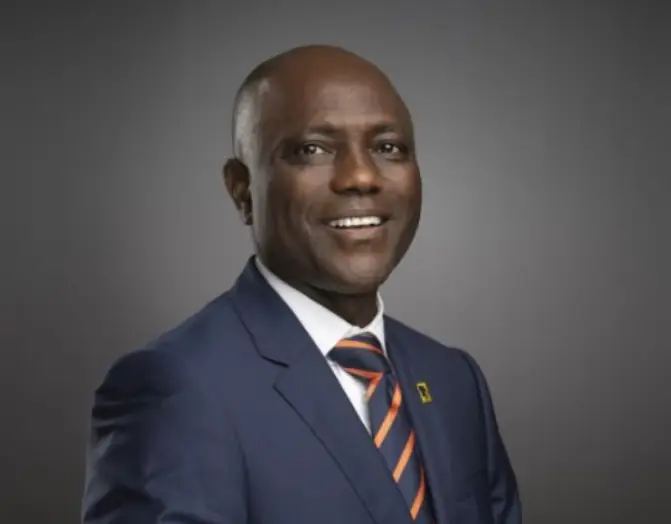
Olusegun Alebiosu has been appointed as the Acting Managing Director/Chief Executive Officer of First Bank of Nigeria Limited (FirstBank Group), effective April 2024.
Alebiosu steps into this pivotal role from his previous position as the Executive Director, Chief Risk Officer, and Executive Compliance Officer, a position he held since January 2022.
Alebiosu brings to the helm of FirstBank over 28 years of extensive experience in the banking and financial services industry. His expertise spans various domains including credit risk management, financial planning and control, corporate and commercial banking, agriculture financing, oil and gas, transportation, and project financing.
READ ALSO: JUST IN: Access Holdings Names New Acting CEO
Having embarked on his professional journey in 1991 with Oceanic Bank Plc. (now EcoBank Plc.), Alebiosu has held several notable positions in esteemed financial institutions.
Prior to joining FirstBank in 2016, he served as Chief Risk Officer at Coronation Merchant Bank Limited, Chief Credit Risk Officer at the African Development Bank Group, and Group Head of Credit Policy & Deputy Chief Credit Risk Officer at United Bank for Africa Plc.
Alebiosu’s academic credentials further enrich his professional profile. He is an alumnus of the Harvard School of Government and holds a Bachelor’s degree in Industrial Relations and Personnel Management. Additionally, he obtained a Master’s degree in International Law and Diplomacy from the University of Lagos, as well as a Master’s degree in Development Studies from the London School of Economics and Political Science.
READ ALSO: Meet Newly Appointed Union Bank CEO
A distinguished member of various professional bodies, including the Institute of Chartered Accountants (FCA), Nigeria Institute of Management (ANIM), and Chartered Institute of Bankers of Nigeria (CIBN), Alebiosu is renowned for his commitment to excellence and ethical practices in the banking sector.
Beyond his professional endeavors, Alebiosu is known for his passion for golf and adventure. He is happily married and a proud parent.
With Alebiosu’s appointment, FirstBank of Nigeria Limited anticipates continued growth and innovation under his leadership, reinforcing its position as a leading financial institution in Nigeria and beyond.
Business
CBN Gives New Directive On Lending In Real Estate
Published
6 days agoon
April 17, 2024By
Editor
The Central Bank of Nigeria, CBN, has released a new regulatory directive to enhance lending to the real sector of the Nigerian economy.
The directive, issued on April 17, 2024, with reference number BSD/DIR/PUB/LAB/017/005 and signed by the Acting Director of Banking Supervision, Adetona Adedeji, signifies a notable shift in the bank’s policy towards a more contractionary approach.
In line with the new measures, the CBN has reduced the loan-to-deposit ratio by 15 percentage points, down to 50 per cent.
This move aligns with the CBN’s current monetary tightening policies and reflects the increase in the Cash Reserve ratio rate for banks.
READ ALSO: JUST IN: CBN Gov Sacks Eight Directors, 32 Others
The LDR is a metric used to evaluate a bank’s liquidity by comparing its total loans to its total deposits over the same period, expressed as a percentage.
An excessively high ratio may indicate insufficient liquidity to meet unexpected fund requirements.
All Deposit Money Banks are now mandated to adhere to this revised LDR.
The CBN has stated that average daily figures will be utilised to gauge compliance with this directive.
Furthermore, while DMBs are encouraged to maintain robust risk management practices in their lending activities, the CBN has committed to continuous monitoring of adherence and will adjust the LDR as necessary based on market developments.
READ ALSO: JUST IN: CBN Increases Interest Rate To 24.75%
Adedeji has called on all banks to acknowledge these modifications and adjust their operations accordingly. He emphasised that this regulatory adjustment is anticipated to significantly influence the banking sector and the wider Nigerian economy.
The circular read in part, “Following a shift in the Bank’s policy stance towards a more contractionary approach, it is crucial to revise the loan-to-deposit ratio policy to conform with the CBN’s ongoing monetary tightening.
“Consequently, the CBN has decided to decrease the LDR by 15 percentage points to 50 per cent, proportionate to the rise in the CRR rate for banks.
“All DMBs must maintain this level, and it is advised that average daily figures will still be applied for compliance assessment.
“While DMBs are urged to sustain strong risk management practices concerning their lending operations, the CBN will persist in monitoring compliance, reviewing market developments, and making necessary adjustments to the LDR. Please be guided accordingly.”

Meet 17-year-old Nigerian Who Won $3.5m Worth Of Scholarships From Harvard, 13 Other Foreign Universities

Drama As Women Fight Dirty, Breasts Fall Out During Spring Break Outing In US [PHOTOS/VIDEO]

Video Of Girl Being Bullied, Slapped At Lead British School Sparks Outrage Online [PHOTOS/VIDEO]
Trending

 Entertainment1 day ago
Entertainment1 day agoBridesmaids’ Dance At Wedding Causes Stir On Social Media [VIDEO/PHOTOS]

 Politics3 days ago
Politics3 days agoEdo Guber: Akoko-Edo PDP Leaders Meet In Igara, Describe Ighodalo, Ogie As ‘Perfect Match’

 Metro1 day ago
Metro1 day agoVIDEO: ‘UNN Lecturer’ Caught Pants Down With Married Student

 News3 days ago
News3 days agoFoundation Advocates Empowerment Of Women, Youth In Nigeria

 Headline5 days ago
Headline5 days agoBest Airports In Africa For 2024 Named, Nigeria Missing [Full List]

 Metro5 days ago
Metro5 days agoBREAKING: Protests As Gunmen Kill 12 In Plateau Village

 News4 days ago
News4 days agoJUST IN: Tinubu Appoints SEC Chairman, Board Members

 News3 days ago
News3 days agoJapa: Types Of US Visa Available To Nigerians, Other Foreigners

 News2 days ago
News2 days agoOutrage As Chinese Supermarket In Abuja Denies Nigerians Entry

 News4 days ago
News4 days agoWhy Police Detained Yahaya Bello’s ADC, Security Details Revelead


